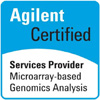home
 services
services  platforms
platforms  agilent: array CGH
agilent: array CGH
|
Array Comparative Genomic Hybridisation (aCGH) is a microarray-based technique used to identify chromosomal copy number changes (deletions, amplifications, and micro-amplifications) on a genome-wide scale, or using custom arrays, on a specific series of regions. |
|
There are currently three different labelling methods available for aCGH depending on the amount and type of sample available for the analysis.
The standard labelling method is an enzymatic reaction which incorporates the dyes directly into the nascent DNA. This method requires between 0.5 µg and 3 µg of high quality intact DNA depending on the array format.
The second method incorporates an additional whole genome amplification step so that smaller amounts of DNA can be used. This protocol requires ~50 ng of high quality intact DNA or 100 ng of more degraded samples, provided that the DNA fragments remain at least 500 bp in length.
The third method was originally designed for FFPE samples but has since been optimized for other sources of DNA. This protocol involves a chemical labelling reaction in which the dye is attached directly to the sample DNA without any amount of amplification. The sample requirements for this method range from 0.25 µg to 2 µg depending on the type of array and the quality of the sample.
The Agilent catalogue arrays all have complete genome coverage in a gene-biased manner with different levels
of coverage depending on the density of the array. It is also possible to design a custom array which has more
specific coverage. This can be used to cover specific regions/genes which are of particular interest. See our
Custom Array page for more information.
Service includes:
- Labelling of two DNA samples per array with cyanine-3 and cyanine-5
- Hybridisation/washing/scanning of arrays
- Spot quantification (Agilent Feature Extraction)
- Feature Extraction output files sent to customer (FTP)
We also offer an optional data analysis service.
Sample Requirement:
| Array Format | Standard | Labelling Methods Amplification | Chemical (FFPE) |
| DNA Quality | intact | >500 bp fragments | degraded |
| 244K / 1M | 3 µg | 50-100 ng | 2 µg |
| 2x105K / 2x400K | 1.5 µg | 50-100 ng | 1 µg |
| 8x15K / 8x60K | 500 ng | 50-100 ng | 250 ng |
Pricing: Download
![]()
Please note that this pricing is for academic groups. Commercial customers should
contact us for a quote.
Contact: Agilent Service at
Custom designs are also available.


